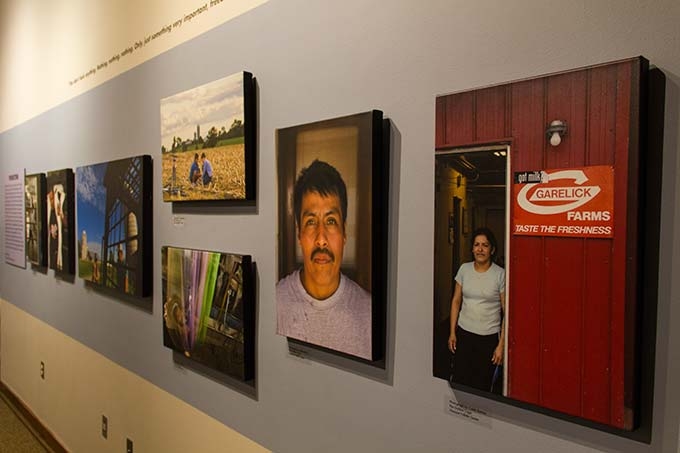Fed Up: The Fight for Ethical Food Systems in Addison County
–
Center Gallery
McCullough Student Center, 2nd Floor
Food systems—all the processes involved in the cultivation, consumption, and disposal of food—have an immense impact on human lives. Food can positively or negatively affect a person’s diet, health, employment, and environment. Many organizations in Addison County are fighting to make food systems as fair and equitable as possible, and to reduce the negative impact that food can have on human beings. This exhibition highlights three such organizations: the Vermont Folklife Center, which has sought to give voice to workers involved in food production; the Mary Johnson Children’s Center, which ensures that fresh, healthy food is available to children regardless of their socio-economic circumstances; and Bee’s Wrap, a company whose products reduce the waste associated with food consumption and storage. These organizations, along with many others, are committed to working toward an Addison County with a sustainable, healthy, and equitable food system.

An installation view of the Fed Up exhibit
Storage and Disposal
A 1987 study found that across the United States, commercial hazardous waste facilities were most frequently situated near minority communities. The environmental justice movement seeks to address the inequality of minority and low-income populations bearing a disproportionate burden of the harsh effects of environmental degradation and waste disposal. Poor and minority communities suffer health and quality of life issues caused by waste that they did not create, but is placed in their communities by those more politically enfranchised. In Bristol, Vermont, the founders and employees of Bee’s Wrap are working toward a world less dependent on disposable plastic. In addition to being reliant on petroleum in its production, plastic sits for thousands of years in landfills, while seeping dangerous chemicals into the groundwater. Bee’s Wrap is a reusable food storage material made out of tree resin, jojoba oil, linen, and beeswax. The materials are both naturally and sustainably sourced and waste is minimized in production. Additionally, Bee’s Wrap is reusable, biodegradable, and compostable, in alignment with founder Sarah Kaeck’s aim to create a more sustainable world. Sarah’s rapidly growing, international business is a powerful reminder that local change can have global reach.
Learn more: www.beeswrap.com
Production
Migrant workers play an integral role in Vermont’s dairy industry, yet often find themselves at odds with a system that deprives them of their voices and their rights. Working with the Vermont Migrant Education Program, tutor Chris Urban and photographer Caleb Kenna interviewed and photographed migrant workers and dairy farmers to document their world “in all of its complexity and contradiction.” Their goal was to create a forum for people to speak in their own voices and allow for self-empowerment rather than objectification. The resulting photographs and interviews comprise the Vermont Folklife Center’s traveling exhibition The Golden Cage: Mexican Migrant Workers and Vermont Dairy Farmers. Portions of that exhibition are included here, as a reminder of the many people—their life stories often hidden—who bring food to our tables.
Learn more: www.goldencageproject.org
Food Security (Reliable Access to Nutritious Food)
Geography and socio-economic status often determine people’s access to healthy food. As such, fresh fruits and vegetables, critical to a balanced diet, are often unavailable or prohibitively expensive to people living in rural areas or on a small budget. People of all ages are left with poorer health, diminished energy, and a less environmentally sustainable diet as a result of factors outside of their control. This manifests itself in many ways; for example, school-age children who would qualify for free or reduced-cost lunches during the school year are left with no clear alternative in the summer. The Mary Johnson Children’s Center offers programs to provide local youth with healthy food during the summer months. Displayed here are photographs from the Rural Fun Delivery program, where workers from Mary Johnson bring food and games to rural parts of Addison County.
Learn more about food security and how to get involved: www.mjccvt.org; www.cvoeo.org; www.hope-vt.org
The curators of this exhibition—Grace Bryan ’16, Morag McKenzie ’16, Daniella Silva ’17, Andrew Smith ’17, and Danielle Weindling ’17—were participants in the inaugural summer of MuseumWorks, a collaboration between the Middlebury College Museum of Art, the Henry Sheldon Museum of Vermont History, the Vermont Folklife Center, and the Middlebury College Center for Careers and Internships. MuseumWorks provides Middlebury College students interested in museum careers with summer internships in local museums. One day each week, interns meet with professionals from across the museum field. They also collaborate on an exhibition practicum.
Many thanks to Bill Brooks, Eva Garcelon-Hart, and Mary Manley at the Henry Sheldon Museum of Vermont History; Greg Sharrow at the Vermont Folklife Center; and Emmie Donadio, Mikki Lane, Doug Perkins, Jason Vrooman, and Meg Wallace at the Middlebury College Museum of Art. Ken Pohlman deserves special thanks for his guidance in the design and installation of this exhibition. We would also like to thank Middlebury Printing Services for their help in producing our exhibition’s brochure. Additionally, we gratefully acknowledge the organizations whose work made this exhibition possible: Bee’s Wrap, the Vermont Folklife Center, and the Mary Johnson Children’s Center.
